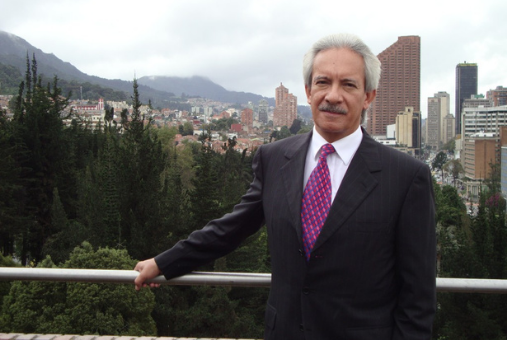For José Rubén Zamora Marroquín, founder and director of Guatemalan newspaper elPeriódico, the government wanted to "fabricate" a criminal case against him by reopening, at the end of October, a case closed years ago.
In an interview with LatAm Journalism Review (LJR), Zamora added that this is because the institutions of the Guatemalan government lack political and financial autonomy, and obey the government of the day.

José Rubén Zamora, Guatemalan journalist, founder and director of elPeriódico. (Photo: Courtesy)
"Guatemala, save the enormous proportions and dimensions, is the country most similar to Russia, Putin's Russia," Zamora said. “Let's say the Soviet Union collapsed and the KGB intelligence people were transformed into a criminal oligarchy that runs Russia's big business. Guatemala is very similar.”
According to the Office of the Special Rapporteur for Freedom of Expression of the Inter-American Commission on Human Rights (IACHR), the public prosecutor's office of Guatemala has been investigating Zamora since 2013, through the Office of the Public Prosecutor for Administrative Crimes.
Following the 2012 publication of a state advertising supplement from the Guatemalan Social Security Institute (IGSS, for its acronym in Spanish) in elPeriódico, the Office of the Public Prosecutor for Administrative Crimes began an audit of the newspaper's commercial operations in 2013, to determine if the amount that the newspaper received in return qualified as money laundering. The audit concluded in 2014 because the prosecution found no irregularities.
However, towards the end of October 2021, Zamora publicly denounced that the case had been reopened. According to information he received from reliable sources, Zamora said, he learned that they wanted to issue an arrest warrant for him, freeze his bank accounts and those of the newspaper, in addition to conducting raids on his home and work.
LJR tried to contact the public prosecutor’s office of Guatemala to confirm the existence of an investigation, but had not received a response as of publication.
When Zamora denounced the reopening of his case, at the same time he published that the public prosecutor’s audit against his newspaper in 2013 did not find anything illicit.
"What they wanted to find [now] is a figure that I did not know, which is called an 'inevitable finding,'" Zamora said, citing what his sources told him. “In Guatemala, there are no institutional checks and balances.”
The Office of the Special Rapporteur called on the Guatemalan government to carry out an impartial and exhaustive investigation of these events, while emphasizing that States must provide the press with the guarantees to carry out their work freely, safely, and independently.
"I think it is a sin of excess optimism in Guatemala to think that the press is the ‘fifth estate,’" Zamora said. "The media are very small against established powers that prevail in our country."
Over the years, since its founding in 1996, the investigative reports and critical articles of elPeriódico have documented alleged irregularities and acts of corruption of the country’s different governments.
For example, in early 2014, Zamora received a notification, based on a criminal suit from then-President Otto Pérez Molina, prohibiting him from leaving the country and freezing his bank accounts. Then, Baldetti initiated a process against Zamora for violence against women.
In response, Zamora accused Baldetti and Pérez Molina of abuse of authority.
Pérez Molina later removed Vice President Roxana Baldetti from office and subsequently resigned to face charges for alleged acts of corruption during his government.
“Apart from the acts of corruption that we have documented for years, we also publish that the president bought a country mansion with money from the State. In addition, we revealed the purchase of a mansion by Baldetti which she named ‘La Montagna.’”
"Many of our journalistic works were used for the investigations of the CICIG [International Commission Against Impunity in Guatemala] against Pérez Molina and his entourage," Zamora said.
Given the situation, thousands of people marched in protest to demand the resignation of Pérez Molina.
In 2015, Pérez Molina resigned from the presidency. Both he and Baldetti remain in prison to this day, with trials ongoing.
“For perhaps 25 years I have proposed that whoever runs the country is a narco-klepto-dictatorship, which is more perfect than the governments that the PRI had in Mexico for decades, because here, every four years we elect a dictator or a President thief who co-governs with the criminal structures that have been running the country since 1982,” Zamora said.
The journalist feels in his day-to-day life that he is not alone. When he goes out to exercise, walk or run, he always encounters the furtive company of plainclothes policemen or armed soldiers on the road.
For their own safety, Zamora's family went into exile in the United States in 2003. Only he and his wife live in Guatemala.
"Many say that I built the perfect labyrinth, and if I have to stay, then let these gentlemen put up with me," he said.
Zamora and elPeriódico have received several international awards for their commitment to investigative journalism.
In June 2021, elPeriódico received the award for outstanding media outlet in Ibero-America from the King of Spain Awards. In 1992, Zamora received the Maria Moors Cabot Award from the Columbia University School of Journalism and in 1995 the International Press Freedom Award from the Committee to Protect Journalists (CPJ), among other prestigious journalism awards.